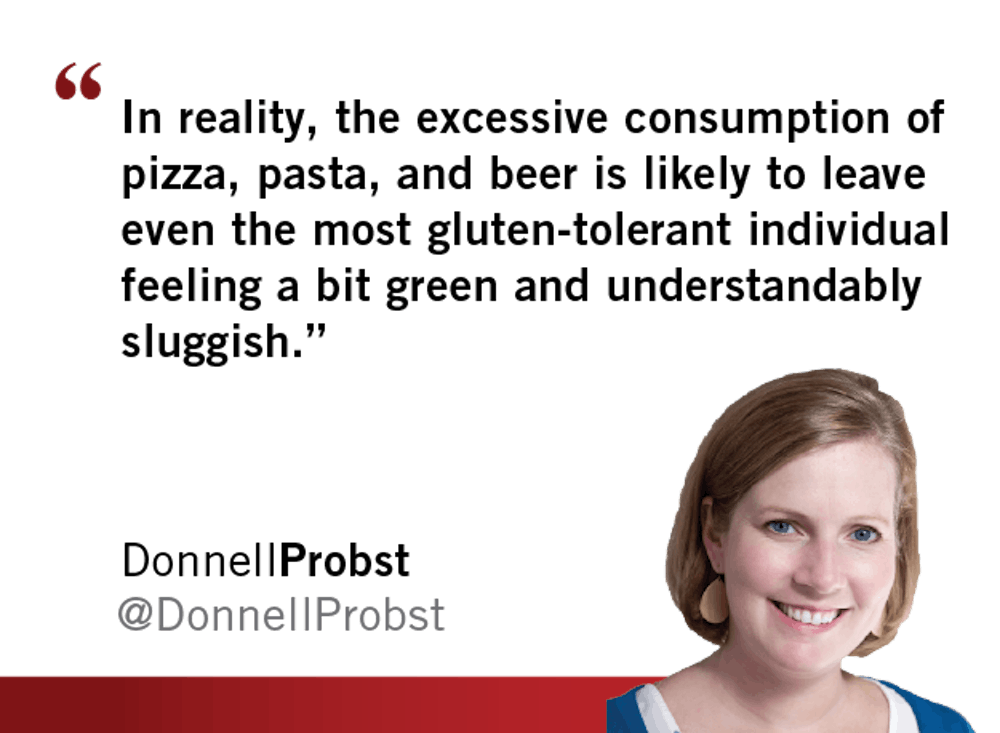The gluten-free fad is creating a host of problems for those who suffer from diagnosed gluten-related problems such as celiac disease, gluten allergies, and non-celiac gluten sensitivity. The most notable of these obstacles are the growing social disdain of gluten intolerance as well as skyrocketing prices for gluten-free products.
Fewer than 1 percent of Americans are diagnosed with celiac disease, a genetic autoimmune disorder that prevents individuals from absorbing nutrients through their small intestine. Another 6 percent are formally diagnosed with a non-celiac gluten sensitivity, a gluten intolerance resulting in an array of symptoms including digestive problems, joint pain, and migraines.
Despite these statistics, nearly 30 percent of all American households are actively attempting to eliminate gluten from their diet — but at what cost?
This growing public demand for gluten-free product has resulted in a booming $15 billion gluten-free industry, a help and a hindrance for the truly gluten-free consumer.
Menus are more commonly labeling dishes gluten-free and grocery stores are contributing entire isles to gluten-free products making the search for adequate products easier for gluten sufferers. The trade-off to this accessibility is the rising costs associated with the consumer-driven goldmine of the gluten-free industry.
According to the National Association of Celiac Disease, gluten-free products cost on average "a jaw dropping 242 percent more” than non-gluten-free products. So while the gluten-free fad is a money grab for manufacturers, it is financially catastrophic for those who have no choice but to buy these products.
Despite the trend towards gluten-free products, packaging, and identification on menus, many of the 23 percent of unnecessarily gluten-free Americans have difficulty even defining gluten, do not fully understand gluten-related intolerance, and often confuse the symptoms of overindulgence in gluten-heavy foods with the actual side-effects of gluten allergies and celiac disease.
In reality, the excessive consumption of pizza, pasta, and beer is likely to leave even the most gluten-tolerant individual feeling a bit green and understandably sluggish.
As gluten is systematically eliminated from the diet of nearly one-third of Americans, there may also be unintended, health-related consequences.
What many gluten-evading dieters don’t realize is that by removing products which contain gluten from their diet they are also eliminating essential dietary fibers. These fibers play an important role in digestive health, including the maintenance of colon health, low cholesterol levels, and even immunity from infection.
Given all of these statistics, it is five times more likely that you will encounter an unnecessarily gluten-free individual than someone who has a diagnosed gluten-related disease or allergy. This simple fact lends to the growing public skepticism over the gluten-free fad.
As public skepticism over the gluten-free fad grows, it becomes increasingly difficult for those who are necessarily gluten-free to ensure their needs are being treated with the urgency they deserve. Not only are requests for gluten-free foods met with eye rolls and a moan, but those who are truly gluten-free are at risk for their needs not being taken seriously, a risk that is potentially detrimental to their health.
Reach the columnist at dprobst1@asu.edu or follow her on Twitter @DonnellProbst
Editor’s note: The opinions presented in this column are the author’s and do not imply any endorsement from The State Press or its editors.
Want to join the conversation? Send an email to opiniondesk.statepress@gmail.com. Keep letters under 300 words and be sure to include your university affiliation. Anonymity will not be granted.
Like The State Press on Facebook and follow @statepress on Twitter.





